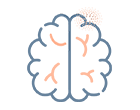Bird TD. Alzheimer Disease Overview. 1998 Oct 23 [Updated 2018 Dec 20]. In: Adam MP, Ardinger HH, Pagon RA, et al., editors. GeneReviews® [Internet]. Seattle (WA): University of Washington, Seattle; 1993-2021. Available from: https://www.ncbi.nlm.nih.gov/books/NBK1161/
Kuller, L., & Lopez, O. (2011). Dementia and Alzheimer’s disease: A new direction. The 2010 Jay L. Foster Memorial Lecture. Alzheimer’s & Dementia, 7(5), 540-550. doi: 10.1016/j.jalz.2011.05.901
Montine, T., Phelps, C., Beach, T., Bigio, E., Cairns, N., & Dickson, D. et al. (2011). National Institute on Aging–Alzheimer’s Association guidelines for the neuropathologic assessment of Alzheimer’s disease: a practical approach. Acta Neuropathologica, 123(1), 1-11. doi: 10.1007/s00401-011-0910-3
Reitz C. (2015). Genetic diagnosis and prognosis of Alzheimer’s disease: challenges and opportunities. Expert review of molecular diagnostics, 15(3), 339–348. https://doi.org/10.1586/14737159.2015.1002469
Goldman, J. S., & Van Deerlin, V. M. (2018). Alzheimer’s Disease and Frontotemporal Dementia: The Current State of Genetics and Genetic Testing Since the Advent of Next-Generation Sequencing. Molecular diagnosis & therapy, 22(5), 505–513. https://doi.org/10.1007/s40291-018-0347-7
Sancesario, G. M., & Bernardini, S. (2018). Alzheimer’s disease in the omics era. Clinical biochemistry, 59, 9–16. https://doi.org/10.1016/j.clinbiochem.2018.06.011






